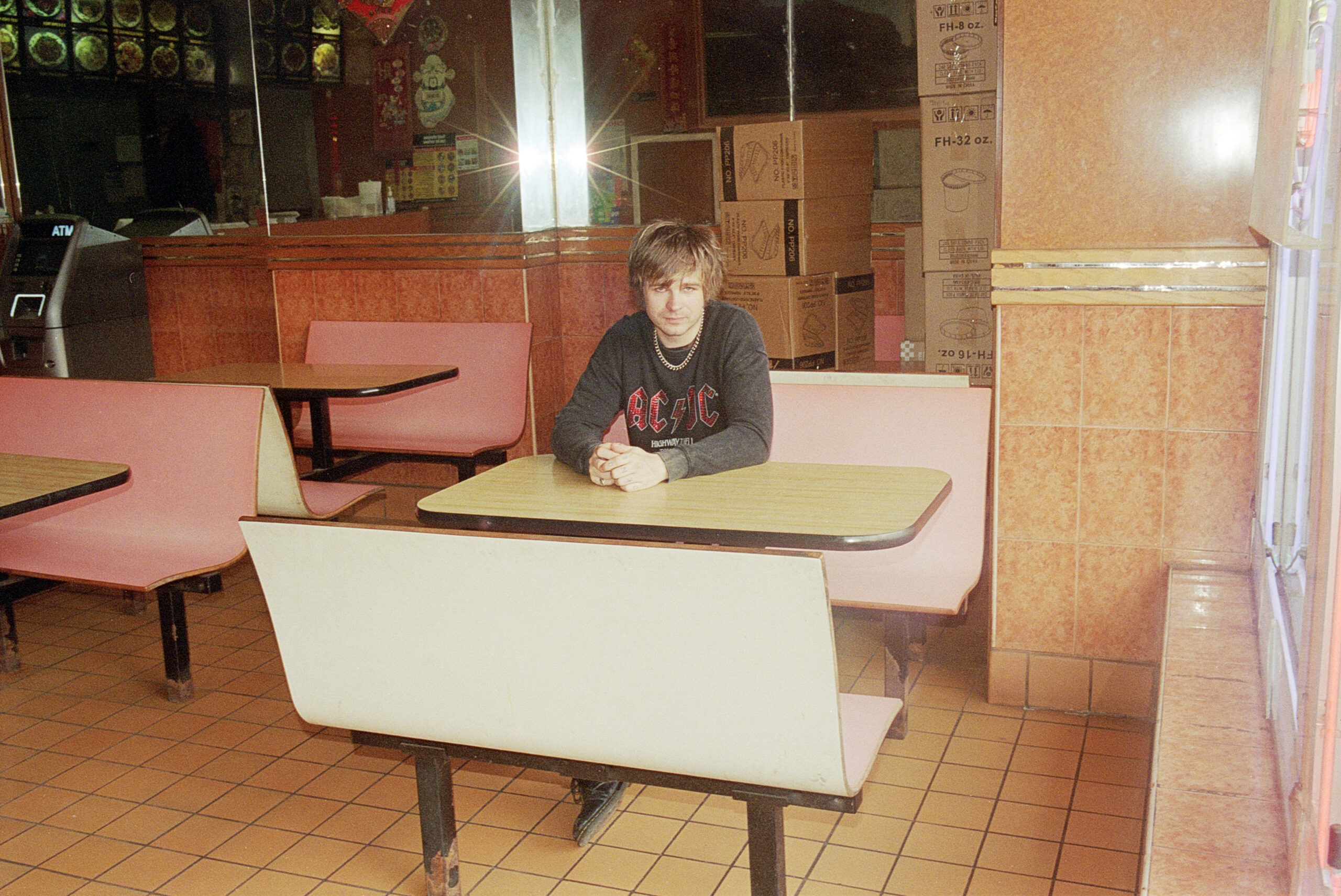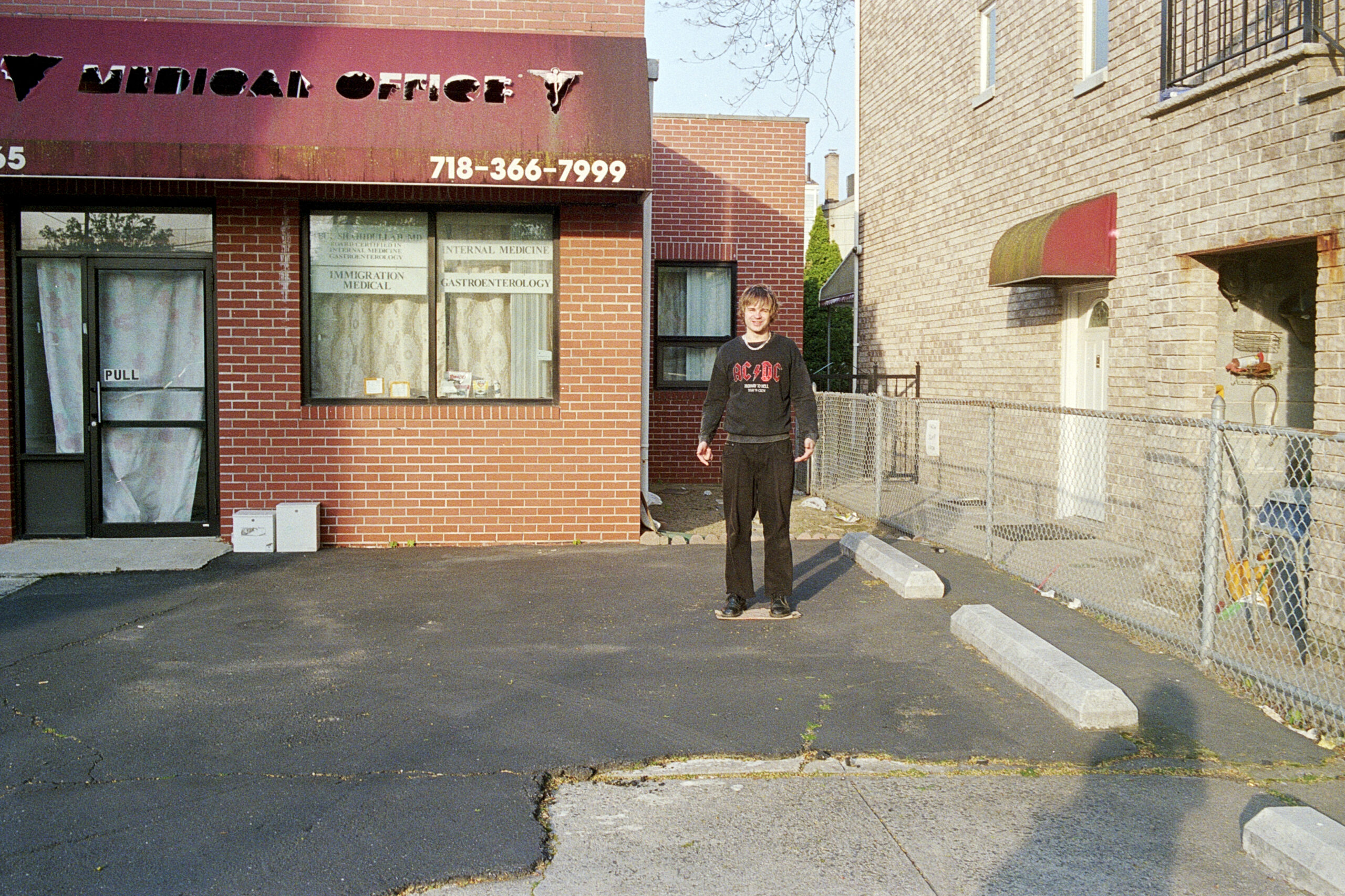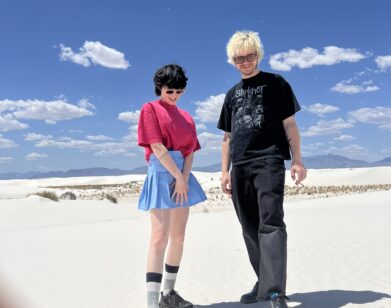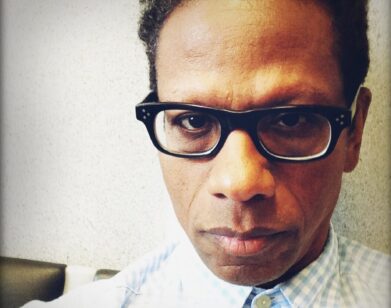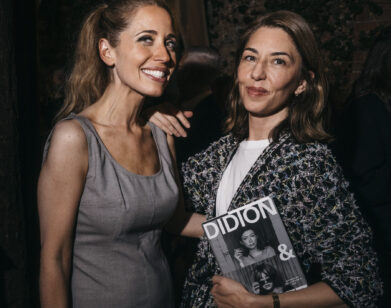DROP
Nate Amos of Water From Your Eyes Just Can’t Stop Making Music
There are 67 unique releases from This Is Lorelei on Bandcamp. The most recent of them, Box for Buddy, Box for Star, is the first “proper” album Nate Amos has put out under his own name. Amos, who is also one-half of groups like the experimental indie-pop darlings Water From Your Eyes (with Rachel Brown) and My Idea (with Lily Konigsberg), makes a lot of music. For Box for Buddy, Box for Star, Amos decided to let his sundry stylistic tendencies run free. There’s twangy bluegrass on opening track “Angel’s Eye,” Postal Service-esque electro-pop on “Perfect Hand,” and, in his own words, a “Bruce Hornsby-ass piano” hook on the ‘80s synth-pop banger “Dancing in the Club.”
This is all to say that Amos wears many hats, figuratively and literally. When I spoke with him backstage at The Truman, a Kansas City venue where Water From Your Eyes was opening for Real Estate, I asked to take some photos. He complied, but not before grabbing an oversized top hat from a nearby coat rack, only to swap that one out for a Daft Punk-esque orange helmet, which prompts his bandmates to start snapping photos of their own.
Roughly a month before the release of Box for Buddy, Box for Star, Amos sat down with me in one of The Truman’s green rooms to discuss maintaining his prolific output with his busy day-to-day schedule and why he considers this to be the first true This Is Lorelei album.
———
GRANT SHARPLES: Nice to meet you.
NATE AMOS: Nice to meet you. I’m very familiar with your username.
SHARPLES: Oh, well, thank you. I’m very familiar with your name.
AMOS: No, I played soccer when I was a kid with someone named Graham Sharples.
SHARPLES: Oh, wow. We must be related.
AMOS: The first time I saw your name online, I was like, “No way, is this–”
SHARPLES: “Is this the soccer kid?”
AMOS: I eventually figured out that it was a different name.
SHARPLES: Well, maybe he’s my long-lost twin or something.
AMOS: You got any family in Winchester, Virginia?
SHARPLES: Not that I know of, but 23andMe will work wonders if I need to find out.
AMOS: For sure.
SHARPLES: I’ve never been in the back of this venue before, so it’s cool to see behind the curtain. I listened to Box for Buddy, Box for Star recently. It’s really, really good.
AMOS: Thank you.
SHARPLES: Does it feel real to you? Because this is the first This is Lorelei album.
AMOS: It feels as real as anything. I’m still getting used to the idea of more people hearing it, mainly in the context of Water From Your Eyes. That was strange, but I feel like it applied to this project too.
SHARPLES: Is it just that more attention is on Water From Your Eyes, and now by extension more attention is also on This is Lorelei?
AMOS: Yeah. But also, once Water From Your Eyes became the priority, it designated Lorelei as the low-pressure side project. And even though it’s not really that anymore, because this album is actually coming out, I tricked myself into feeling like it still is. Nothing’s happened too quickly, so I’ve been able to keep up with it.
SHARPLES: And I’m sure also being on the road warps your sense of time pretty dramatically.
AMOS: Yeah, absolutely. I’m really out here forgetting what month it is for a couple minutes.
SHARPLES: It’s May by the way, just so you know.
AMOS: I actually saw that the release show for this album is a month away as of either today or yesterday, and I was like, “No, that can’t be right.”
SHARPLES: So why did it now feel like the right time to release this record?
AMOS: A couple of reasons. A lot of the album deals with approaching standardized songwriting elements, in terms of the classic singer-songwriter stuff and playing with that medium. And the idea of actually making it a 43-minute, 10-song album, to me, is the classic album format. So it made sense to give it a proper rollout as a debut album, because it’s more thought through than other things that I’ve done. We actually cut songs and edited songs and tried to make it better.
SHARPLES: Did you set out with the intention of, “I’m going to make a 40ish-minute, 10-song record?”
AMOS: No, not at all.
SHARPLES: It just happened that way?
AMOS: That’s how it eventually came together. It started off as a writing spree, because it was culled from a much larger group of songs that was written over the course of the summer. The first version of this album that I thought I had finished was eight songs. I think only two of them ended up on the final version of the album.
SHARPLES: Oh, wow.
AMOS: It was 60ish songs. A lot of the other ones have come out since then. I used the stuff I cut to make it so that I felt like I was still releasing something.
SHARPLES: Keep up that prolific streak.
AMOS: Yeah. This album was going to take two years to get it out there the right way, if I really wanted to do that. And I know myself well enough to anticipate that, until it comes out, I’m not really going to write other Lorelei stuff. That’s just always how it’s been, because until it’s actually available and online, I can’t fully move past it.
SHARPLES: So how do you go about choosing what makes the cut?
AMOS: At one point it was a 32-song album, and I didn’t want to cut any more. I had to shift gears instead of trying to just choose the best 10 songs. It was finding the songs that felt like the thesis statements, and starting with those. Then it became more about choosing songs that happened to fit together, rather than trying to find the best songs.
SHARPLES: What were some of those theses, as you put it?
AMOS: There were just certain songs that felt definitive of the group as a whole, whereas there are some songs that felt more like tangent pieces. It’s nothing really in particular lyrically. I was thinking mostly musically, because a lot of the time what I would do is start with music and then write lyrics really quickly, but then choose what to keep working on based on how much I liked the lyrics. Whereas this project, all these songs started with lyrical ideas, so I flipped it.
SHARPLES: You’re really indulging your pop inclinations in these projects. Is that how you think of each one? To me, Water from Your Eyes seems like the more experimental one. And then with This is Lorelei, there are straight up pop songs on it.
AMOS: I will say, musically, Water from Your Eyes is way more adventurous than Lorelei. Lorelei is conceptually a little more complicated because it’s studying classic songwriting, but also making fun of it and diving into all these dualistic songwriting archetypes, choosing all the most obvious things thrown out, good and evil, money, God and Satan, gasoline-type thing.
SHARPLES: Maybe by playing with a lot of known things, you understand its limitations better. You have to stay within a certain frame, but your creativity is also a little freer, however contradictory that can seem.
AMOS: Well, as soon as there’s confines to work within, once you have that structure, then you can turn your attention to detail. Whereas if there are endless possibilities you could just end up fucking walking into the distance, and then you’ve gone nowhere. It’s more challenging in a way. I feel like it would be way more difficult for me to build a functioning chair than make an abstract wood piece.
SHARPLES: Yeah.
AMOS: That’s a fun challenge and in this album, I’m poking less fun at it. I feel like when I was finding that idea some of the Lorelei stuff was just over-the-edge funny with the singer-songwriter stuff. It’s a weird balance.
SHARPLES: So when you sit down to write music are you just going in with a mentality like, “I’m going to write a Water From Your Eyes song,” or “I’m going to work on a Lorelei song”? Are you able to switch gears just consciously as you go?
AMOS: Yeah, definitely. I’m never really working on both things at once. Right now I’m in a Water writing era and whenever I feel like it’s time, I flip back into the Lorelei stuff. I can switch from one thing to the other, but it’s something that doesn’t have to happen all that often. It’s happening in this two-year cycle. We’re trying to focus on writing one thing for a year and the other things, too.
SHARPLES: Because there has consistently been so much output just from the Water From Your Eyes extended universe.
AMOS: There is a lot of content built up. There is stuff they’re just sitting on. We’re going, “What are we going to do with this?” We get knick-knacks aplenty when we ask for stuff, which is fun.
SHARPLES: There is just material for whenever the moment is right. You’re like, “Okay, maybe I can take a look back at this thing I made last year and see how I feel about it.”
AMOS: Yeah. Sometimes it’s hard to keep track of all those things, too. When I’ve been able to remember something and then actually find it, then there has got to be something to it. But I’m so disorganized that I lose a lot of those things.
SHARPLES: They’re just files in the ether somewhere.
AMOS: Well, from Water From Your Eyes, “Barley” and “Buy My Product,” the tracks for those got made around the same time. I forgot that they were two separate things. One of them I was working on with Rachel and my roommate was just like, “There is another one of those.” It’s like, “What are you talking about?” “I swear to God, there is another one of those tracks.” I thought it didn’t exist and he made me go through my hard drive then we found it.
SHARPLES: Those are two of my favorite Water tracks. I’ll have to thank your roommate for that.
AMOS: Thank you, Steve.
SHARPLES: Shout out to Steve. Are there any tour plans in the works for Lorelei? You just did some shows right?
AMOS: I did, God, I don’t even know how long that was. It was a little less than a month. There’s some future shows. But apart from that, it’s festival season. Water From Your Eyes is pretty booked. The nature of this situation is that Water From Your Eyes is my job, so I need to prioritize touring and finishing the next album or whatever. But I’m definitely doing Lorelei stuff where I can. Still trying to play on a regular basis and keeping an eye out for breaks where we can plot some more regular touring.
SHARPLES: When do you write the music with your schedule so booked from touring?
AMOS: Here and there you get two weeks off in between tours and that’s just enough time to sink into the zone and capture one or two ideas to take with you. Finding the initial idea is always the hard thing but once you have it, you can work on it while on the road.
SHARPLES: In terms of your inspirations for this record, I know you talked about the traditional pop song and those tropes. Were there any albums or artists or even non-musical stuff that you were tapping into?
AMOS: Well, with Water, the whole idea is to take the influence from visual sources and try to apply them to sound. Whereas with this it’s talking about playing into the different existing practices. So it’s like an album about music in a lot of ways. But in terms of individual people, Shane MacGowan, I had gotten really into him for the first time. Townes Van Zandt is someone that I’ve just got to think about constantly regardless of what I’m working on. There is one song in particular where I was thinking a lot about, not even really about bluegrass but more like Everly Brothers, harmony music. The closer on the album, it’s like a born-again, satanist song that exists in some parallel universe, Appalachia, that has drums.
SHARPLES: Just like a slightly fucked up version of a very warm folk song?
AMOS: Yeah. I grew up playing bluegrass music because my dad is a bluegrass musician, so that stuff is very deeply ingrained. There is some of that in here. Well I guess “Dancing In The Club” has direct references to things. It’s got that Bruce Hornsby-ass piano that’s so clear. Anybody who has ever listened to Bruce Hornsby will know exactly what that is.
SHARPLES: It does feel like there is a lot of bluegrass, especially in the latter half.
AMOS: Well, the whole thing is like a funnel. I realized that at a certain point. I was like, “Oh, a lot of this is borderline Americana once you get further than the songs with the bleeps and bleeps.”
SHARPLES: Is that how you tried to go about sequencing it?
AMOS: As I was working on it that became a concept. It starts really tight and cohesive, then begins to drift out and wander later in the album. And that implies this feeling of diffusion. I wanted to do the opposite of that where it feels like over the course of it, things are actually coming closer together. I don’t know if that’s the kind of thing that anyone would ever really pick up on. It’s an interesting thing to be an overlay on the dynamic curve of the album, which is very independent from that kind of convergence.
SHARPLES: And then it comes back.
AMOS: Well you start at the extremes. It starts with the straight up country song, followed by the most electronic song on the whole thing. From there it just slowly moves inward until you’re at the end of this homogenous acoustic rock thing somewhere in between those two. Because once it lands there it kind of stays there. The whole second half of the album is in that zone. It moves away from electronics entirely and it phases out sampling and programming so by the end of it it’s mostly real performance, relatively unedited.
SHARPLES: So do you think there will be another album?
AMOS: Oh, yeah, totally. I don’t know if it will be anything like this one. But there will be more of this stuff. There has to be because I’m not going to stop doing this.
SHARPLES: That’s right, because you’ve made so much music under this name, but waited to do an album till now. I was wondering if you were planning on continuing down this path or if you really enjoy just the, “I just wrote this and I’m going to put it online right now”?
AMOS: I like both things. I always figured, at least for the last couple years, there would be a point where I legitimized or moralized a project and started being responsible in the way it comes out. I really fought that for a while. But then I had a last hurdle where it was just batshit for two years, so much shit music. In a way, that felt like capping off that period. This is the first time where I feel like I have actually tried my best on a worldwide album. There is always some kind of conceptual cop-out I had where I’d be like, “Well, no, this song is from a moment and I don’t want to fuck up that moment. Anything that I change now will make it less honest.” There is some merit to that idea, but I just worked that way for so long that choosing to be very methodical and careful, particularly with lyrics is something that I actually really enjoy and I’d never really done that before.
SHARPLES: What was that process like? What did you enjoy about writing the lyrics this time around?
AMOS: Maybe “enjoy” wasn’t the right word. Words were always secondary in the process to me, as I learned how to do things. A lot of these songs started with melodies and something that I was thinking about a lot was writing melodies that didn’t need any chord progression in order to feel a complete thing. Specifically, “All Fucked Up”, “Dancing In The Club”, and “An Extra Beat For You And Me” are good examples, and “Where Is Your Love Now?” too. They would sound just as complete if you were walking through the woods whistling them, as they do on the album.
SHARPLES: So you write the melodies and then see how the lyrics fit into those?
AMOS: Or see how the instrumentation fits into them. Sometimes the melody and the words would happen simultaneously. And then treating the backing track is like, “Okay, all I want to do to this backing track is emphasize what’s going on with the vocals.”
SHARPLES: I guess that’s a big component of the pop songwriting approach, too.
AMOS: Yeah. And hopefully that will make people like the song.
SHARPLES: It’s a little more accessible.
AMOS: Definitely, without being bubblegum pop. Because that’s the trick, to look at what accessible music is. There’s a lot of stuff that’s just so candy-coated with sugar on top. You have to get through a lot of that to figure out like, “What is it about this that people actually like?” Melodies that function efficiently without chords seems to be a thing that I kept coming back to.

